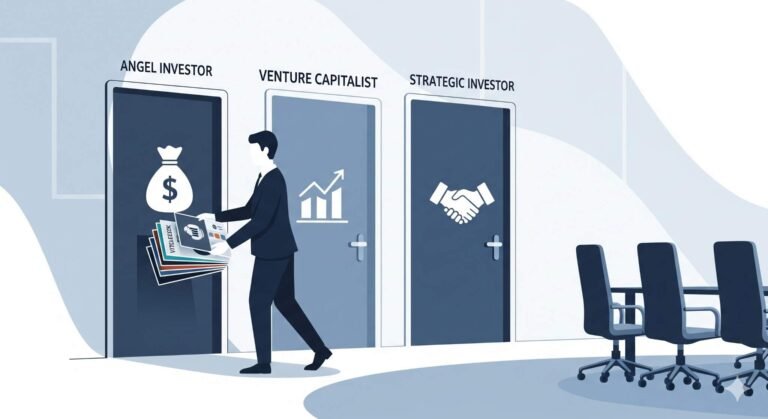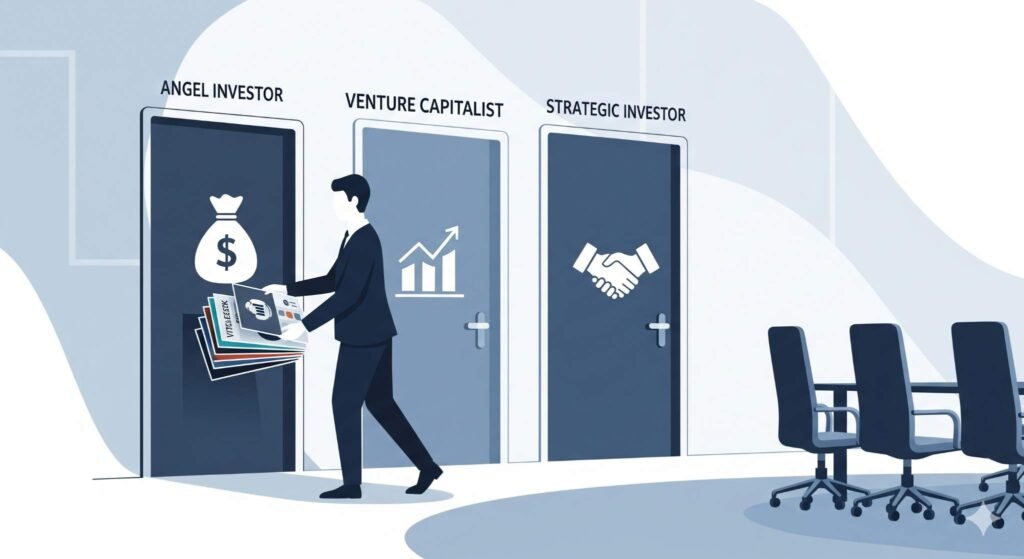Introduction:
In terms of securing funding for your startup, understanding your audience will play a big part. Angel investors and venture capitalists (VCs) are two of the most readily available sources of capital for startups. However, the expectations from a pitch deck can be varied between these two. Hence, the more you tailor your pitch deck according to the specific needs and preferences of investor types, the more likely you’ll be to succeed. This blog is written to tell you about who an angel investor and VC are, what the differences between them are, and how those differences can affect your work in putting together a pitch deck.
Who are Angel Investors?
An angel investor is a high-net-worth individual who invests in a new venture in return for equity or convertible debt by those responsible for raising funds themselves. They usually get involved in the development of a company at its initial stages and provide the first capital required to have the business take off. Angel investors are normally motivated by a mix of potential returns on investment, passion for entrepreneurship, and personal interest in the industry or product. They can also be motivated by a desire to mentor new entrepreneurs and contribute to the growth of innovative businesses.
Who are Venture Capitalists (VCs)?
Venture capitalists are professional investors who pool funds from multiple sources, including institutional investors, to invest in startups and small businesses that have very high growth potential. VC investors are different from angel investors. Angel investors usually operate independently, unlike VCs, who represent a firm or group and are expected to generate substantial returns on investment for investors. Their investments are also much larger, and sometimes they make them at much later stages of development for a startup.
Differences Between Angel Investors and VCs
Stage of Investment:
| Angel Investors | Venture Capitalists VC |
| Typically, invest in businesses that are still refining their products and exploring market fit. | Prefer to invest in companies that have established a solid market presence and require capital to scale operations. |
| Often the first external funding source, it helps startups move from idea to prototype or initial market launch. | Often participate in multiple rounds of funding, providing the capital needed for significant expansion and market penetration. |
Amount of Investment:
| Angel Investors | Venture Capitalists VC |
| Usually provide one-time or smaller rounds of funding to cover early-stage costs like product development, initial marketing, or hiring key personnel. | Often lead larger, syndicated funding rounds, pooling capital from multiple sources to meet substantial financial needs. |
| More flexible in terms of investment size and terms, often willing to adjust based on the startup’s immediate needs. | Investments often come with conditions or milestones that the startup must meet to receive further funding. |
Involvement:
| Angel Investors | Venture Capitalists VC |
| Often act as informal advisors, providing personalized mentorship based on their entrepreneurial experiences. | Typically bring in a network of resources, including industry experts and professional advisors, to support the startup’s growth. |
| Tend to develop close, personal relationships with the founders, offering ongoing support and encouragement. | Often require regular reporting and accountability, ensuring the startup meets agreed-upon milestones and strategic goals. |
Impact on Pitch Deck Creation
When crafting a pitch deck, it’s crucial to understand your audience, whether angel investors or venture capitalists (VCs), and customize your presentation to meet their specific expectations.
Angel Investor Pitch Deck:
Angel investors are generally driven by passion and vision emanating from the founders and by the impact potential of the product or service. Your pitch deck has to be more story-driven, wherein you tell the world about your startup’s mission, the problem you are trying to solve, and how innovative your solution is. Early market traction and a personal connection of the founder to the product can be very powerful. Convey the passion and dedication of the team and the relevant experience in such a way that there can be a connection with angel investors. From this, customize a pitch deck that attracts angel investors and gets invested.
Venture Capitalist Pitch Deck:
VCs are interested in how scalable your proposition is, the market potential, and the financial returns. To create a perfect VC pitch deck, find these key elements. The pitch to VCs should emphasize and focus on hard market analysis, revenue models, and strong financial projections. Showcase that your business model could be efficiently scaled and how you would capture a large market share. A clear ROI with metrics and a proper growth strategy is what the VCs would look for.
Conclusion
Differences between angel investors and VCs are as important to know for effective tailoring of your pitch deck. Angel investors are very focused on early-stage potential and passion, but VCs would consider scalability, details in financial projections, and a clear path to ROI. Therefore, you greatly enhance your possibilities by aligning your pitch deck with the specific expectations of the types of investors such as these.
Know your audience before pitching. Tailoring the pitch deck for either angel investors or VCs is a longer exercise in sorting out who to pitch and how to pitch, but it can make all the difference between having to look elsewhere and locking up the investment. Contact us to learn more









